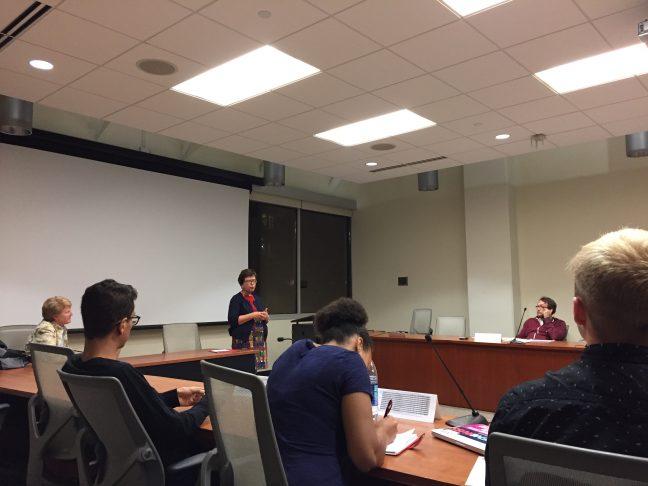University of Wisconsin Chancellor Rebecca Blank Wednesday attended an Associated Students of Madison meeting to discuss internal budget affairs and the progress of the pilot campus climate initiative, “Our Wisconsin.”
Wisconsin operates on a biennial budget, and this year is the biennial anniversary in which the budget will be set for the next two years, Blank said.
Higher education has been cut in five of the six biennial budgets, which means in ten out of the last 12 years UW has been filling in those gaps, Blank said.
“In the last two years alone, we cut $50 million out of the budget of the University of Wisconsin-Madison, and that was not painless,” Blank said.
As part of a recent statewide campaign to build a more stable financial base, UW is focusing on outsourcing different investment opportunities.
The Board of Regents has requested close to $100 million in new budget money for the UW system this year, as well as less funding dependence from the state, Blank said.
“Right now 15 percent of our dollars come from state dollars— that is a pretty small number,” Blank said.
A major part of this request includes giving control of tuition back over to the Regents, who were prevented from raising in-state tuition for five years. In-state tuition is frozen for one more year.
Blank also discussed a university initiative created with input from students, staff and faculty to address the issue of UW’s campus racial climate and a recently released progress report.
A specific program,”Our Wisconsin,” engages 1,000 new students living in specific residence halls in dialogue centered around diversity, inclusivity and implicit bias.
The program is composed of two sets of conversations. The first set is already over and the second set is about to begin, Blank said.
This program will be evaluated at the end of the semester to analyze its effectiveness by comparing reactions between students who received and did not receive the training, Blank said.
“I would rather pick a set of high-impact things, implement them, make them work and look around and say ‘What next?'” Blank said.
Students have been told to complete the online campus climate survey which focuses on where students feel most uncomfortable and comfortable and why.


